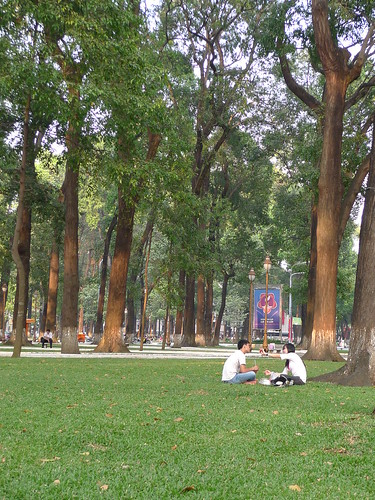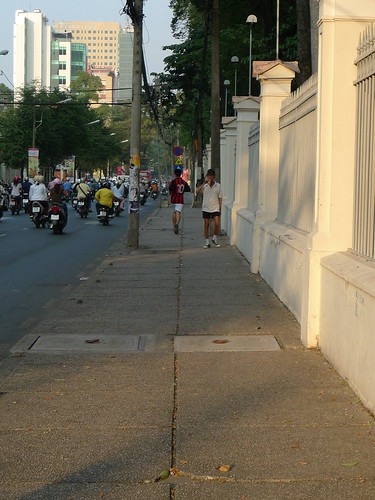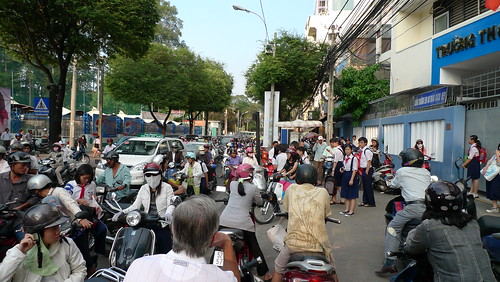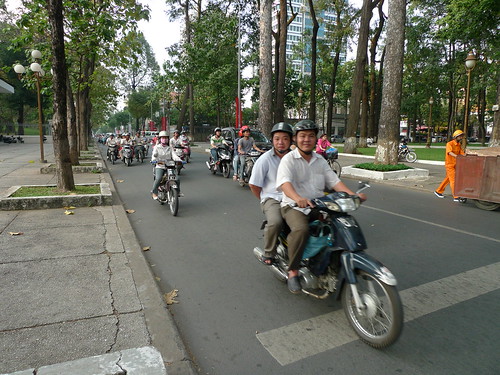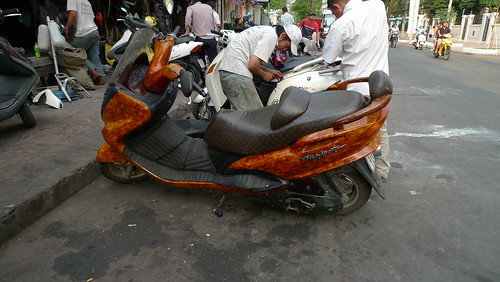Under intense diplomatic pressure, I am forced to retract my last post: Phnom Penh is, in fact, not necessarily the skankiest city I've ever seen. Probably. The smelliness and the offer of child prostitutes in broad daylight made me less than objective.
To be honest, it really isn't that bad. It's just that, nested between Thailand and Vietnam, it's a shock to see how far it's lagging behind its neighbours.
The first time I visited India, I had some ridiculously high expectations. The myth of IT powerhouse India had taken on a life of its own. India was supposed to be highly educated, wired-up, modern and ready to step up as a global superpower. It was a reality in downtown Mumbai, and maybe Bangalore, but the rest of the country lagged far behind.
Sure, India can brag about its cellphone coverage, internet connectivity and massive emerging middle-class, but at the same time, a significant segment of its population was destitute, and even more lacked access to modern sanitation, healthcare, education, and everything else they need to move up the ladder.
I'd recalibrated my expectations for “developing nations” accordingly. If India was leading the pack amongst developing nations, well...
It was a shocking thing to see in Vietnam: Joggers. Parks full of them. People who treated calories as a nuisance, not as energy. People who could make a living with enough time and energy left over to run around in circles. More than the flash cars and the flash cellphones, it was the joggers who made the biggest impression on me, that Vietnam was really doing rather well.
With that in mind, I compiled this list.
You know your country has made it when:
* You have public sanitation (yay!).
* You have public spaces.
* Locals use the public spaces.
* Old people sit around these public spaces instead of doing anything useful.
* You jog, when nothing is chasing you.
* You have to line up to pick up your kids from school after work.
* Your kids go to school and you have work.
* KFC stops being an aspirational brand.
* Starbucks starts being an aspirational brand.
* You pay $4 USD for shitty coffee.
* A 5.56mm round goes for $1.50 USD a pop, and only tourists buy them.
* Your head is worth more than a helmet.
* You can tastefully pimp your scooter.
* All you want from tourists is for them to get off the goddamn road already.
--
Meanwhile, few tears are going to be shed for those sentenced to death over the melamine case. There are arguably more tears being shed that *more* people didn't get the death sentence, especially Tian Wenhua, the former chairwoman of Sanlu.
Not that angry mobs can justify anything, but I think Keith Locke really got the wrong end of the stick last week:
The death sentences are a symbol of the problem, not part of the solution... They show the harshness of the regime towards anyone who embarrasses it, whether they are real criminals, whistleblowers or dissenters. Many Chinese knew the milk was being contaminated but said nothing for fear of repercussions from those in authority."
Sure, the Chinese government is an autocratic regime, and it does a lot of shitty things to stay in power, etc., but here's the rub – if an autocratic regime tries to maintain power by governing well, is that really a bad thing?
Of course, that assumes that executing people was an example of governing well. Somewhat perversely, I think it's much more justifiable to execute people for economic crimes than for violent ones. First, people who commit economic crimes are likely to be more rational and almost certainly premeditated. That means that they will consider the consequences much more carefully than violent offenders, making harsher deterrents more effective.
And the consequences of their crimes are much more significant than violent offenders. What violent offenders – hell, what terrorist group – can cause the kind of lasting damage and panic that we saw? In this case, it was a direct link: melamine = sick infants. But in every corruption case involving public funds, there are massive consequences downstream, from weakened health or public sanitation services to substandard infrastructure or schools that are unsafe.
If the death penalty can deter these economic crimes, and these economic crimes affect millions of people, isn't it worth it?
The ironic thing about Locke's statement is, whether the death penalty is an effective deterrent or not, this is the Chinese government acting with the full support of the people. If anything, a democratic Chinese government would be even less likely to spare the death penalty.

